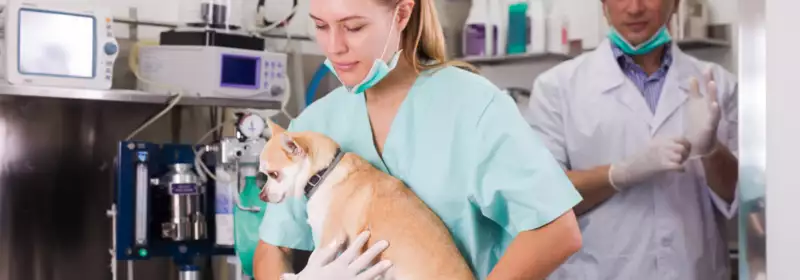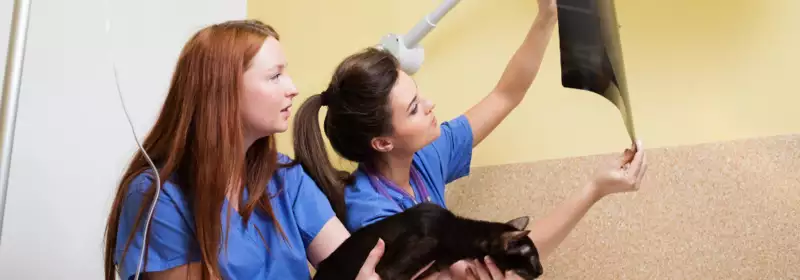Vet techs are veterinary nurses in the UK and are accredited professionals who deliver medical care to animals alongside veterinarians. Helping domestic pets, livestock, wildlife and sometimes exotic animals of all shapes and sizes maintain and return to good health.
People who work as veterinary nurses commonly have a love for animals. An adoration which sees them looking for ways in which they can get involved in improving their health and welfare. Ask any vet tech/nurse and they’ll tell you that the role is hard work. But ultimately, it’s also extremely rewarding.
While these comments are common, there are certainly misconceptions that exist surrounding what is involved in the role. As an aspiring vet tech, it’s wise to be fully aware of what to expect before you venture down this career path. Doing a bit of research can help you determine if you’re suited to veterinary nursing before you start studying. Plus, it’ll help you hit the ground running once you qualify.
We’ve put together some advice for an aspiring vet tech. To help paint a clear picture of the role and tips to help you navigate it successfully.

Understand the differences between support roles
While the vet and vet nurses work side by side to organise animal patient care, there are others who help the process. Veterinary nursing and support assistants are common roles, especially in larger facilities that need more helping hands.
It’s important to know that these are also roles that are available to you, but they have their limitations. As a veterinary nurse, you’ll perform high-responsibility tasks under the supervision of a licensed vet. Such as tests, assisting in surgery, treating in accordance to instruction and handing out prescriptions.
Assistant and support staff will perform tasks with less risk. Such as feeding, weighing, cleaning cages and taking the temperature of animals.
To work as a Registered Veterinary Nurse and have the ability to perform all permitted procedures you need a recognised qualification. And registration with the Royal College of Veterinary Surgeons (RCVS). Whereas assistant and support staff don’t need to be registered.

It’s not all puppies and kittens
It’s not uncommon to hear people say they prefer to work with animals over humans. And while your job is assisting and nurturing animals, you’ll spend a high portion of your time dealing with people.
This can be a difficult part of the job as, understandably, people often feel passionately about their pets. Meaning that as much as your advice is coming from education and training, they may feel that they know best. You’ll have to be calm, patient and understanding, but firm in providing care that’s in the animal’s best interest.
There will also be times where you’re dealing with the effects of abuse or neglect. Whether it’s intentional or not. You need to be prepared for seeing animals in many states of ill-health and be ready to act. Remaining level-headed and professional while you get the animal the help it needs.
Unfortunately, with this line of work euthanasia also plays a big part. While you are doing right by the animal, you need to consider if this is something you can handle regularly.
There are many challenging aspects of the veterinary nursing profession, but there are also great ones. For every difficult owner, there will be those who are overjoyed with the help you’ve provided. Plus, you’ll bring many adorable animals into the world and help them lead happy, long and healthy lives.
You need to be physically fit
While there is paperwork involved, you’re not likely to be sat at your desk for much of the day. Most of it will be spent on your feet, lifting heavy animals and trying to keep them still. As veterinary nurses handle many tasks of high responsibility, you’ll likely be needed in multiple places at once. Running from room to room and making sure everything’s under control is a regular procedure. So be prepared for fast-paced physical work and invest in some comfy shoes.

It’s no 9-5
Animals can get sick at any time of the day or night, so don’t expect to be working office hours. Full-time vet nurses work between 39-49 hours a week. Depending on where you end up working and the services provided, weekend work, night shifts and call outs are common. Though on-call duties are usually shared on a rota basis between staff.
You’ll need experience and you need to find it early
To get onto most study and training programmes you’ll need to have work experience or be employed in a veterinary setting. As vet nursing is a popular career choice, these can at times be hard to come by. So, it’s best to get in there early and line up opportunities in advance.
Ways you can find these opportunities are:
- Checking local newspapers and online job boards
- Viewing local veterinary practice websites
- Attending related open days and career events
- Following veterinary organisations on social media
- Contacting your local vet practice directly
- Gaining other relevant work experience to boost your employability prospects
Work experience is a valuable part of the process. It helps you network, potentially line up permanent employment and see what the vet nurse role is like up close.

Consider a specialism
Veterinary nursing roles previously had a reputation for being very underpaid. Thankfully, salaries have since significantly improved. Now veterinary nurses can earn up to £22,300 on entry to the profession and with experience up to £38,600.
If you’d like to increase this earning potential, you could also consider a specialism. Not only do they offer room to explore your interests, they come with opportunities for progression and a higher wage.
A few of these career development opportunities are:
Train in rehabilitation
You could train to become a veterinary physiotherapist or hydrotherapist to help animals in recovery.
Become a Clinical Coach
Clinical coaches support student vet nurses in their formal training and help them develop their practical skills in practice.
Teach
Once you’re a registered veterinary nurse you could pass on your skills and expertise to the next generation. Teaching positions vary but often it involves lecturing, presenting workshops and helping develop course material.
Go into sales
Many qualified vet nurses go into sales roles with the companies and service providers that supply the industry.
Pursue leadership and management roles
You could become a head nurse or work towards becoming a veterinary practice manager with experience.
Explore other options through CPD
Continuing professional development courses provide ample opportunity to pursue professional interests and undertake training in a range of topics. Such as caring for exotic pets, feline medicine, anaesthesia and dentistry.

Becoming a vet tech/vet nurse is undoubtedly challenging, but it positions you to make an incredible difference to animal lives. Without veterinary care, domestic and wild animals would suffer tremendously. With training, you can become one of the hard-working people who work tirelessly to keep them safe and well.
If you’re considering your options in veterinary work, there are online courses you can take to explore the field. Our Veterinary Nursing Assistant and Veterinary Support Assistant courses can help you get into the industry and find your feet.
You can gain a foundational knowledge of veterinary practices and get a real insight into what the field involves. Then, when you’re ready, you can pursue qualifications that allow you to become a fully qualified veterinary nurse.
Find out more about these courses provided by learndirect - the UK’s leading distance learning provider – by clicking here.
Alternatively, if you’re ready to start a rewarding animal career but don’t know which path to take, click the link to download our FREE animal course brochure below and find the course that suits your goal.



















